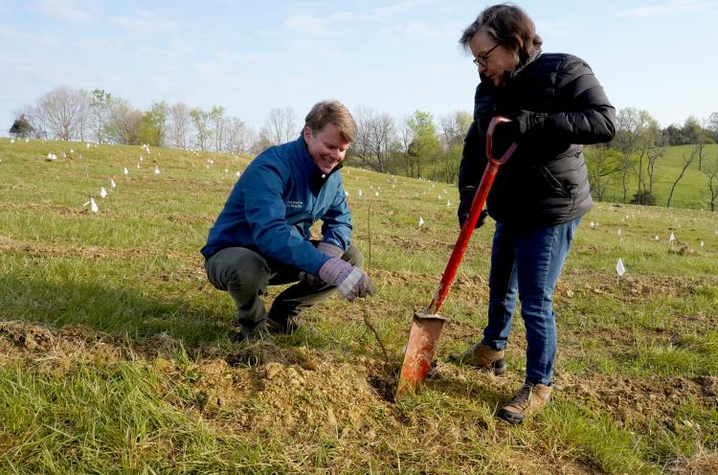 LORETTO, Ky. — This Earth Day 2021, the University of Kentucky announced the establishment of the world’s largest repository of American white oak as part of their groundbreaking effort with Maker’s Mark® to conserve, explore and secure the future of American white oak.
LORETTO, Ky. — This Earth Day 2021, the University of Kentucky announced the establishment of the world’s largest repository of American white oak as part of their groundbreaking effort with Maker’s Mark® to conserve, explore and secure the future of American white oak.
The repository is part of a larger mission to transform the conservation of a species critical to many American industries, including Kentucky bourbon, and to prioritize the present and future of forests and rivers. The massive effort at Star Hill Farm in Marion County, home to Maker’s Mark Distillery, represents the most comprehensive natural range of white oak to date anywhere in the world.
UK Department of Forestry and Natural Resources tree improvement specialist Laura DeWald leads a project collecting more than 300 unique families of white oak from across the United States to plant at Star Hill Farm. The first planting took place April 15, successive plantings over the next several years will result in the largest single white oak genetic repository in the United States.
It will provide the foundation for research and tree improvement to address current and future threats to white oak trees and the millions of acres of forests they dominate. It will also support white oak-dependent industries that contribute billions of dollars to rural and urban economies across the region.
This American white oak repository is the second phase of an unparalleled collaboration between UK and Maker’s Mark, which also includes the world’s first comprehensive effort to map the white oak genome.
Working with Maker’s Mark and the cooperage Independent Stave Co., the UK team is studying the genetics of a mother tree called MM1 at the Star Hill Farm, which is one of the oldest white oaks in Kentucky. It has been exposed to incredible climate variations and is estimated to be 300 to 500 years old. Data from this study will give UK, ISC and Maker’s Mark information about the longevity, disease resistance and vitality that American white oak can offer to the bourbon industry and beyond.
“We have lost or are fast losing some of our most valuable tree species in the U.S. such as ash, chestnut and elm due to disease and pests,” said Seth DeBolt, director of UK’s James B. Beam Institute for Kentucky Spirits. “This collaboration, the combination of the white oak genetic fingerprint and the germplasm planted solely at Star Hill Farm, will allow us to prepare for any future risk to this organism. In simple terms, if a risk arises, we can look for examples of natural variation within the germplasm that can tolerate new pests or even different climates.
“Maker’s Mark is absolutely leading the way in the bourbon industry when it comes to looking at the sustainable future of the natural resources used to make bourbon. If other threatened species had this level of support, we would have a huge leg up in protecting our ecosystems.”
Rob Samuels, eighth-generation whiskey producer at Maker’s Mark, said the distillery is committed to the partnership.
“We’re so honored to work with the experts from UK who share a common passion with our team for ensuring the sustainable future of the American white oak, and we’re excited for Star Hill Farm to be the new home of this essential repository and study, in addition to the home of Maker’s Mark Bourbon,” he said. “At Maker’s Mark we are fully committed to going beyond the practice of being good stewards of the environment, as we aim to be one of the most environmentally conscious and beneficial brands in the world.”
“To do something like this that talks about the sustainability of a tree species, it will take a long time for the work being done here to come to fruition, so it takes a vision and commitment,” said Jeff Stringer, UK Forestry and Natural Resources department chair. “Maker’s Mark understands that. They have seen that vision and understand it and are in it for the long haul. They are willing to put in the effort and resources to make this work. It may take 50, 70, 90 years for any barrels to come from this research and that’s a long-term vision that many companies don’t have these days. Maker’s Mark does.”
The partnership between UK and Maker’s Mark began nearly two years ago as one piece of the iconic bourbon brand’s vision to protect and sustain natural resources by not only supporting the white oak forest, but regenerating forest production with healthy, sustainable and superior trees. This unique collaboration highlights the unparalleled passion and emphasis that Maker’s Mark is pushing forward to protect the state’s natural resources, which will be vital to the future of bourbon, Kentucky’s signature beverage.
“The commitment of Maker’s Mark and Independent Stave Company will substantially improve the sustainability of this species, other forest species and this signature industry,” said Nancy Cox, UK vice president for land-grant engagement and dean of the UK College of Agriculture, Food and Environment. “We cannot thank them enough for their partnership, vision and sense of community.”




















Add Comment